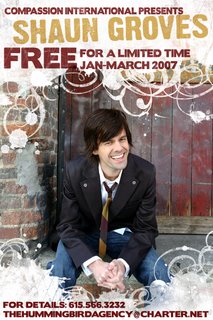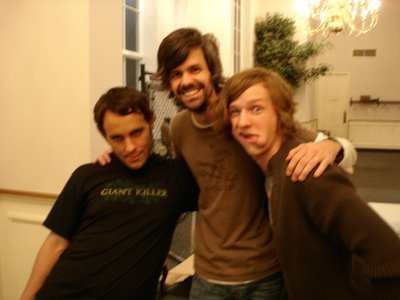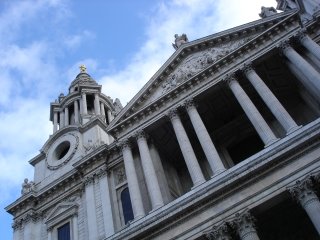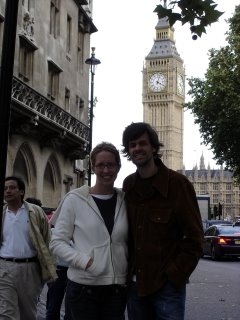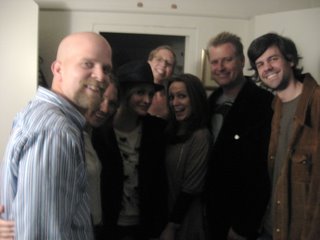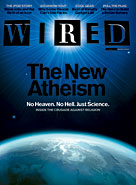
On the way to California this past weekend I finished reading the latest issue of
WIRED - my favorite magazine. (Thanks
Randy for recommending it to me years ago.)
Fascinating. In a geek meets theologian sort of way.
The issue is titled "The New Atheism: No Heaven. No Hell. Just Science." And it's main story
The Church of the Non-Believer is written by a self-desribed spiritually undecided journalist researching the claims of what he calls the "New Atheists." The new atheists he meets could also be called religious extremists. And this shoe swapping makes for
an interesting read. The journalist may be entertained by the similarities between the extremists within religion and non-religion too, because he seems to be subtly drawing parallels between them. Or maybe that was accidental. What do you think?
Richard Dawkins, for instance, whom the article calls the "leading light" of this new atheist movement, wants atheists in places of power. (We call this Constantinianism in the Christian faith) He wants to spread atheism by taking entertainment, congress and even the White House. But he sees atheists as an unloved minority incapable of being accepted in politics, kicked out of public schools (by intelligent design) and not allowed to be spoken about in the town square. (Sound familiar?) "Highly intelligent people are mostly atheists," he says. "Not a single member of either house of Congress admits to being an atheist. It just doesn't add up. Either they're stupid, or they're lying. And have they got a motive for lying? Of course they've got a motive! Everybody knows that an atheist can't get elected."
Dawkins, while liking to play the minority card, also talks out of the other side of his mouth equally well, claiming that atheists are a larger group than most realize and growing.
Look at how many col people are atheists, he seems to be saying.
Look how popular we are. "The number of nonreligious people in the US is something nearer to 30 million than 20 million," he says. "That's more than all the Jews in the world put together. I think we're in the same position the gay movement was in a few decades ago. There was a need for people to come out. The more people who came out, the more people had the courage to come out. I think that's the case with atheists. They are more numerous than anybody realizes."
The most non-pretentious and everyday brilliant of the bunch seems to be Glen Slade. He, like any extremist, blasts the moderates who take the cause less serious. And he, better than anyone, makes the obvious parallel to the Christian faith, which shares the same sociological problem the new atheists face: the vast moderate of "followers" in any movement are moderates, those who agree with a handful of basic tenants but do not adhere to any doctrines of the movement which would require non-comformity to culture at large. "Moderates give a power base to extremists [he says, not realizing he himself is an extremist in the atheist movement]," Slade says. "A lot of Catholics use condoms, a lot of Catholics are divorced, and a lot don't have a particular opinion about whether you are homosexual. But when the Pope stands up and says, 'This is what Catholics believe,' he still gets credit for speaking for more than a billion people."
So the pope gets "credit for speaking for millions who in reality don't know or care about the pope's every pronouncement and attend church rarely if ever (Stats back this up, not just for Catholics but for Baptists and other denominations as well) and the new atheists speak publicly on behalf of millions of atheists world wide who, in reality, don't follow the new atheist teachings or agree with their modus operandi.
What is the new atheists' plan? In a word, conversion.
"How much do we regard children as being the property of their parents?" Dawkins asks. "It's one thing to say people should be free to believe whatever they like, but should they be free to impose their beliefs on their children? Is there something to be said for society stepping in? What about bringing up children to believe manifest falsehoods?"
What's the solution? The new atheists, a tiny minority, are trying their darndest to ween you and I from the opiate of the masses. They're holding meet-ups and establishing what look to be churches, gatherings of atheists preaching the virtues of atheism, encouraging one another to stay the course, claiming familyhood with atheist celebrities like Keanu Reeves and then going out to preach the "good news" to their families and friends.
The movement even has it's eschatologists akin to our Tim Lahaye or Hal Lindsey, those who preach that not stopping the opposing forces to their ideology will undo the entire human race, probably with a great war. Sam Harris, not the Star Search winner from two decades past, released a book two years ago called
The End of Faith: Religion, Terror, and the Future of Reason. It sold well. Very well. In his latest book,
Letter To A Christian Nation, he writes to Christians saying, "Nonbelievers like myself stand beside you, dumbstruck by the Muslim hordes who chant death to whole nations of the living. But we stand dumbstruck by you as well – by your denial of tangible reality, by the suffering you create in service to your religious myths, and by your attachment to an imaginary God."
Now, I'm not writing this post defensively. In fact, I was reluctant to write it at all because of the knee-jerk reactions from Christians I just knew would appear instantaneously in the comments. You know the ones. The slightly more adult versions of "I know you are but what am I?" With a "God Bless" thrown in at the end of course.
No, I'm writing this because I'm agry. I'm not. No, I think hearing the words of any religious movement, even the non-religious movement that doesn't realize it is a religious movement, gives us the opportunity to experience what it's like on the outside of a collection of devoted religious converts. We can hear their sermons and read their plans and experience, maybe for the first time, what it's like being them when we discuss our faith and when they discover our plans..even if that faith and those plans actually only belong to the minority at the fringes.
I have no real point other than that. I'm not anti-fringe. In fact, I think I'm on one, just a different one within Christianity that doesn't get much press. If anything I empathize with the new atheists, disagreeing totally with their core beliefs, but understanding their frustration with those in their flock who gravitate towards culture at large in an effort to be accepted and appear humble. The moderates that frustrate, whether Christian or atheist, speak the same language. The language of democracy. "I think I'm right but who knows? I might be wrong? What do you think? Am I right?"
It's the language of this WIRED article's last paragraph.
If we reject [the New Atheists'] polemics, if we continue to have respectful conversations even about things we find ridiculous, this doesn't necessarily mean we've lost our convictions or our sanity. It simply reflects our deepest, democratic values. Or, you might say, our bedrock faith: the faith that no matter how confident we are in our beliefs, there's always a chance we could turn out to be wrong.Of course respectful conversation is a great thing. But, as extreme as this may sound, there are things which we should believe we are not wrong about. And to say we know these things is admirable no matter how non-democratic doing so is these days.
Of course a respectful conversation to some is one that contains no absolutes - unless they are scientific laws - and always ends with "but that's just my opinion, what do you think?" To have that kind of conversation about, say, my belief that there is a God, would be like having a conversation about the time of day that goes something like "...it might be daytime but I'm not sure, so let's keep discussing it or, hey, better yet, let's just do away with the concepts of night and day and live instead in perpetual twilight. I'm happy. Are you happy? Are you happy with me?"
Moderation that brews up this new kind of "respectful conversation" is our common enemy Mr. Dawkins. To most folks our disdain of it makes you and I the same. We're religious. We're narrow minded pricks who disrupt the peace with our side-making absolutes. Welcome to religion, Mr Dawkins.









